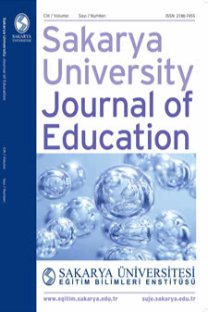Hasan Celal AKGÜL’“ Özlem AFACAN" Hatice MERTOĞLU
Bu araştırma, Türkiye'deki ilköğretim fen bilgisi öğretmen adaylarının biyoteknoloji algısının bir bölü- mü olan genetiği değiştirilmiş organizmalar (GDO) hakkındaki farkındahklarını açıklamak üzere dü- zenlenmiştir. Bu nedenle durum geniş bir örnekleme yapılarak tanımlanrmştır. GDO farkındalıkları ve bunun etkileri konusunda ayrı ayrı nicel analizler yapılmıştır. Araştırmadaki katılımcılar Türkiye'deki üç farklı şehirde yer alan üç büyük üniversitedeki İlköğretim Fen Bilgisi Öğretmen adaylarından oluş- maktadır. Bunlar; Sakarya’da Sakarya Üniversitesi, İstanbul'da Marmara Üniversitesi ve Kırşehir’ de Ahi Evran Üniversiteleridir. ”GDO Farkındahk Ölçeği” veri toplama aracı olarak kullanılmıştır. Bu öl- çek ziraat mühendisi, biyoloji öğretmeni ve fen bilgisi eğitimcisi araştırıcılar tarafından geliştirilmiştir. Yirmi dokuz Likert tipi madde içeren orijinal ölçek uzman bir ekip tarafından oluşturulmuştur. Ölçeğin maddelerinin analizi on bir maddenin geçersiz sayılmasım gerektirmiştir. Bu nedenle veriler ölçekte ka- lan on sekiz madde iizerinden değerlendirilrrıiştir. Veriler araştırmaya katılanların ölçeğin birçok mad- desi hakkında bilgi ve farkındalıklarının olmadığını göstermiştir
Anahtar Kelimeler:
GDO farkındahğı, tarımsal okuryazarlık, fen bilgisi öğretmen adayları, biyoteknoloji
Prospective Elementary Science Teachers' GDO Awareness
This is a research study designed to describe the Turkish prospective elementary science teachers' understandings about genetically differentiated organisms (GDO) as part of their perceptions about biotechnology. Therefore, it is a description of a current situation with a large sample. It is a quantitative survey in which individuals' understandings of GDO and the effects that were investigated. Research participants were 246 prospective elementary science teachers from three large-scaled universities located in three different cities in Turkey. Namely, Sakarya University in Sakarya, Marmara University in Istanbul and Ahi Evran University in Kırsehir. The “GDO Awareness Scale” was used as a data collection tool. It was developed by the researchers who were science educator, biology teacher and agricultural engineer. The original scale consisted of twenty- nine likert type items which were chosen from the item list generated by a team of specialists. Item analysis of the scale required to leave eleven of the items. Therefore data collected with the remaining eighteen item scale. Data display that research participants do not have adequate understanding and knowledge about the issues stated concerning most of the items.
___
- Bybee, R.W. (2010). Advancing Stem Education: A 2020. Vision. Technology and Engineering Teacher, 70(1). 30-35.
- Buyukozturk, S. (2002). Sosyal Bilimler İçin Veri Analizi El Kitabı: Pegem Yaymcılık Tic. Ltd. Şti. Adakale Sokak 4/B Yenişehir Ankara.179 s.
- Harms (2002). Biotechnology Education in Schools. Issues in Biotechnology Teaching, 5(3), 205-209.
- Harms, U. (2002). Biotechnology Education in Schools. Issues in Biotechnology Teaching. 5(3), 205-209.
- Simon, R. (2010). Gender differences in knowledge andattitude towards biotechnology. Public Understand. Sci. 19(6), 642—653.
- Tekin, H. (1996). Measurement and evaluation in education. Ankara: Yargi Publications.
- Lui,Z. (2008). An environment-friendly, multi-gene silencing event-based & genetic-stable approach for preventing spread of transgene & invasıve specıes. Annual Report,Innovative Fruit Production, Improvement and Protection.Project Number: 1931-21000—017—10.
- Ellstrand, N.C. (2006).Scientists Evaluate Potential Environmental Risks of Transgenic Crops. California Agriculture. 60(3), 119—120.
- Mat-too, K. (2000). Transgenics for a Better Tomato(September 2000).Agricu1tural Research magazine.
- ISSN: 2146-7455
- Yayın Aralığı: Yılda 3 Sayı
- Başlangıç: 2011
- Yayıncı: Sakarya Üniversitesi Eğitim Bilimleri Enstitüsü
Sayıdaki Diğer Makaleler
BOOK REVIEW-An Introduction to Multicultural Education
Abdullah ADIGÜZEL, Abdullah ADIGÜZEL
How Should Historical Reenactment Be Used in History Teaching?
Hasan Celal AKGÜL’“ Özlem AFACAN" Hatice MERTOĞLU
Hasan AKGUL, Özlem AFACAN, Hatice MERTOGLU
Readability of Texts Turkish Textbooks in Grades 5
Alpaslan OKUR, Gökhan ARI, Fatma ERSOYOL, Esra OKUR
Hasan Celal AKGÜL’“ Özlem AFACAN" Hatice MERTOĞLU
Hasan AKGUL, Özlem AFACAN, Hatice MERTOGLU
Öykü Temelli Öğrenme Yaklaşımına İlişkin Öğretmen ve Öğrenci Görüşleri
